Touting country’s ‘major success’ fighting the coronavirus, Netanyahu says all limitations on gatherings to be removed next month if infection and serious case rates don’t rise

Prime Minister Benjamin Netanyahu and other top officials on Monday announced a dramatic easing of the social distancing restrictions meant to contain the coronavirus, lifting limitations on movement and economic activity.
“We achieved major success” in containing the virus, Netanyahu said during a press conference at his office in Jerusalem, citing the declining rate of new infections and the fast-growing number of people to recover from COVID-19, while noting that “every death is a great loss… it’s heartrending.”
The premier chalked up Israel’s success against the virus to the early steps by the government, including the closure of borders, imposition of social distancing guidelines and digital tracking. Comparing Israel to other similarly sized countries that sustained far larger death tolls, Netanyahu defended the severity of the Jewish state’s social distancing measures and said they justified their devastating economic price.
He also highlighted the efforts of health workers and the public’s adherence to government directives.
Among the restrictions that Netanyahu said would be lifted was the 100-meter limit on travel from home for activities deemed non-essential.
“I know you’ve been waiting for this for a while,” he said.
Visits to immediate family members would again be permitted, including with grandparents, for the first time in six weeks. But social distancing should be maintained on visits to elderly relatives, with no hugs or kisses, he said.

Effectively immediately, gatherings of up to 20 people will be allowed in open areas, to be expanded to up 50 people on May 17. Weddings and funerals can now have up to 50 people if they are held in open areas.
Netanyahu said a cancellation of all limitations on gatherings was planned for June 14, “assuming that no red light is lit.”
Turning to the economy, Netanyahu said malls and outdoor markets would be allowed to reopen Thursday, but would need to adhere to certain restrictions.
He also vowed that the process for the self-employed and small business owners to receive financial assistance from the state would be eased.
With some grades returning to school this week, Netanyahu said kindergartens would reopen on May 10, while all students will return to classes by the end of the month. However, he did not give a time-frame for the resumption of activities in daycare centers.

Universities and colleges are set to reopen on June 14.
Restrictions were also set to be eased on sports and leisure, with Netanyahu saying guidelines would soon be published for the reopening of parks, hotels, guesthouses and other venues. Domestic flights would also resume within weeks, he said.
As for international flights, he said Israel was seeking a way to “reconnect to the world,” but without exposing the country to contagion from those countries that were still grappling with far higher infection rates.
(Israel is among seven nations that have made progress in combating the coronavirus, which are joining together to promote tourism and trade between them as they look to rebuild economies battered by the virus, the Wall Street Journal reported Sunday. The initiative, proposed by Austrian Chancellor Sebastian Kurz, would provide a way for the countries to begin opening borders without the fear of letting in virus carriers. Israel currently bars the entry of all foreigners and Israelis returning from overseas must quarantine for two weeks.)

In his remarks, the prime minister warned that a second outbreak of the virus was possible, and laid out criteria for a potential snapback of restrictions in the case of a fresh wave of infection.
He said that in order for the easing of the restrictions to continue as planned, the number of new infections would have to remain under 100 a day outside of virus hotspots, the rate of new cases doubling would have to be less than 10 days, and the number of patients in serious condition must remain under 250.
To achieve this, Netanyahu repeatedly implored Israelis to practice social distancing, maintain good hygiene, and wear masks.
“This is the key to everything,” he said.
The announcement that further restrictions would be eased came as the infection rate has dropped off significantly in recent days, with the number of new cases over 24-hour periods consistently falling below 200 since the start of last week. On Sunday night, Israel registered only 29 new cases in the previous day, and on Monday night 38.
As reported by The Times of Israel
